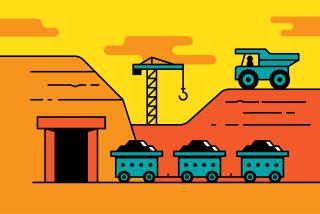Town May Have Drawn Losing Hand in Deciding to Gamble : Colorado: While the areas are now booming since gaming was legalized a year ago, residents believe it cost them their homey lifestyle.
- Share via
CENTRAL CITY, Colo. — It used to be that Donna Martin was acquainted with everyone she passed on the street. She could share coffee and gossip at the cafe and take her kids out for pizza.
Not anymore.
Since gambling was legalized last Oct. 1, Martin and other residents have lost their only grocery store, the lone service station and that comfortable coffee shop.
And don’t even talk about parking at the bank and the post office.
“Gambling has not done us any good,” said Martin, Gilpin County manager and a mother of three. “We have lost our sense of community. It’s not like we had that much before, it’s just that we had community places to go.
“The culture shock for these people is unreal.”
Martin isn’t alone in her discomfort since legalized gambling created a gold rush in the mother lode of Central City, Black Hawk and Cripple Creek.
“I think it’s a little overbearing as to what we thought was going to happen. It’s a noisy place right now . . . there’s a lot of squawking for one thing or another,” said Cripple Creek Mayor Henry Hack. “We’re trying to stay on top of this thing.”
Supporters say the towns are experiencing a modern-day version of the growing pains they endured during the mining boom of the 1800s. Eventually, things will settle down, they argue. They also point out that gaming has pulled the towns out of a critical economic slump.
“I certainly can live with it in comparison with other things,” said Imogene Rich of the Gilpin County Historical Society. “It’s served its purpose. That’s the positive thing we have to look at.”
Black Hawk and Central City, about 40 miles from Denver, and Cripple Creek, 40 miles from Colorado Springs, were founded in the late 1800s during the mining boom.
After mining petered out, the three towns survived on legalized gambling, but that was outlawed in the late 1940s. Then they turned to tourism, relying on a brief summer season to carry them through the winter.
But tourism wasn’t enough and populations in all three towns dwindled. Residents began searching for something to help revitalize their economy, and seized upon legalized limited-stakes gambling.
Colorado voters gave them the go-ahead in 1990 despite opposition from anti-gambling groups and Gov. Roy Romer.
The towns’ residents envisioned a few slot machines and a poker table or two set up inside the shops and tourist attractions.
They got more than they bargained for.
From a hilltop overlooking Black Hawk and Central City, the towns blend into a jumbled scene of freshly painted buildings and construction rigs rising from the lower reaches of the valley.
Private cars and shuttle buses fall into a steady stream of traffic beginning on the outskirts of Black Hawk and continuing nonstop through Central City, guided by full-time traffic control workers.
Private vehicles park in mostly dirt-packed lots that are arrayed in a checkerboard pattern across both towns--$5 per slot.
Downtown, dust filters through the air, which is replete with the groans of heavy equipment, sputters of bumper-to-bumper traffic and the plunks of slot machine winnings.
The law limits gaming purposes to a maximum of 35% of the total square footage of a building. But the Colorado Gaming Commission ruled that cashier cages and other support areas were excluded from the limit, which gave developers a loophole.
Now, casinos line the narrow streets; only a few gift shops and a candy store are left that don’t offer gaming. The situation is much the same in Black Hawk and Cripple Creek.
Jobs are plentiful, but housing, especially rentals, is difficult to find. Residential space sells for about $50 a square foot, and a one-bedroom apartment rents for $600 to $700 a month, said Central City Mayor Dick Allen.
To cope with the construction boom, Central City imposed a building moratorium that will run until January to give the council time to address such issues as transportation, parking and water, he said. The city’s budget has skyrocketed from $350,000 in 1990 to $6 million for 1992.
Gambling has fulfilled its original intent, giving fuel to five initiatives on the Nov. 3 ballot that would expand gambling to other regions in the state.
In the first nine months, the industry generated $96.5 million in gross revenues--twice as much as state analysts had projected. Tax revenue totaled nearly $10.8 million, $4.6 million more than state estimates.
As of June 30, there were 56 casinos in the three towns, employing 4,760 people, the Colorado Gaming Division reported. Nearly one-half of the employees--2,128--work in Central City.
Still, gambling just hasn’t turned out the way most Central City residents thought. Their feelings are bolstered by a study conducted by University of Colorado researcher Patricia Stokowski, who said the industry has created a few instant millionaires, but has forced many common folk to move away.
“The resulting development bears no resemblance to the claims of the early gambling campaign,” she said. “It’s neat to look at it from a distance, but you don’t feel the soul of the place anymore.”
Kelly Schrader, 19, agrees. “The town needed something different. In the long run, it will help the town, but sometimes you wonder if it could have been something different,” she said.
More to Read
Sign up for Essential California
The most important California stories and recommendations in your inbox every morning.
You may occasionally receive promotional content from the Los Angeles Times.










